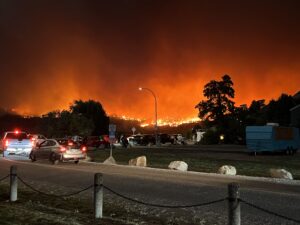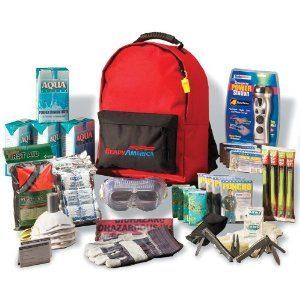Right across Canada and the United States, we’re witnessing the heartbreaking devastation caused by wildfires. It’s shocking to see communities, homes, and businesses literally vanish in a matter of minutes. But here’s the thing: even in the face of such immense danger, you can take steps to stay safe and ready.

When the possibility of you being forced to flee your home to safety arises, being prepared can be a game-changer. It’s about ensuring you and your family, including your furry friends, are ready as possible. This post is your guide to those 13 essential steps you should do if you need to evacuate because of a wildfire. From keeping up with the latest information to packing up an emergency kit and planning your escape route and where to go, each of these steps is crucial. Following this advice and listening to what local authorities suggest gives you the best shot at staying safe when a wildfire evacuation becomes a reality.
1. Stay Informed and Act Swiftly
Staying informed is crucial during a wildfire event. Listen to local authority’s emergency broadcasts and use official notification apps to receive accurate information and evacuation orders. Acting swiftly to respond to these alerts can significantly enhance the safety of your family and pets.
2. Plan Multiple Evacuation Routes
Always have more than one evacuation route planned if possible. Our roads and highways can become congested, so knowing alternative routes to safety is essential. Avoid already busy roads and follow officials’ directions to secure areas. Remember that you and your family may not be together when the Evacuation Order is dropped. Make sure all family members know where you are planning to go and have that information close at hand!
3. Prepare an Emergency Kit
Having a well-stocked emergency kit can be a lifesaver. Include essentials like water, non-perishable food, medications, important documents, flashlight, batteries, and a portable phone charger. Your emergency kit should cover your basic needs for at least 72 hours, but a week is even better. Keep your family’s kits in your vehicle when you are on Evacuation Alert. This will be one less thing for you to do when evacuating. The kits will be safely stored away in your vehicle. For full details on preparing Disaster Kits, click here
documents, flashlight, batteries, and a portable phone charger. Your emergency kit should cover your basic needs for at least 72 hours, but a week is even better. Keep your family’s kits in your vehicle when you are on Evacuation Alert. This will be one less thing for you to do when evacuating. The kits will be safely stored away in your vehicle. For full details on preparing Disaster Kits, click here
4. Ensure Communication
Keep your mobile phone charged and carry a backup charger. Establish a communication plan with family and friends to stay connected and informed about each other’s safety. It is also essential to write down your family’s cell phone numbers and where you will stay. Should cell phones not be working or you don’t have access to your phone – at least you have the phone numbers. If I were to ask you right now – how many of your family cell phone numbers do you know without looking at your phone? I am guessing you probably don’t.
5. Consider Your Transportation

Check your vehicle’s fuel level and ensure you have enough fuel for an extended journey. As you evacuate, you don’t want to be waiting in lineups for gas or, even worse, running out of gas as you, your family and pets make your way out of town to safety.
6. Don’t Forget Your Pets
 When evacuating from wildfires, don’t forget about your pets. They’re part of your family too. Always plan for their evacuation alongside yours. Leaving your pets behind isn’t a good idea because you can’t predict when you’ll be able to come back. Ensure you pack their carriers, leashes, and enough food and water to keep them safe and taken care of during the evacuation.
When evacuating from wildfires, don’t forget about your pets. They’re part of your family too. Always plan for their evacuation alongside yours. Leaving your pets behind isn’t a good idea because you can’t predict when you’ll be able to come back. Ensure you pack their carriers, leashes, and enough food and water to keep them safe and taken care of during the evacuation.
7. Medications and Medical Needs
 Remember to pack prescription medications and essential medical supplies for your family and pets when preparing to evacuate. This includes gathering prescription medications required by you and your family members and vital medical supplies to manage any existing health conditions. Given the potential limitations in accessing medical facilities during an evacuation, having an ample supply of medications is crucial. Don’t forget your pets – collect their drugs and treatments, ensuring their health needs are met. Organize a list detailing each medication’s purpose and dosage instructions to ease stress in high-pressure situations. By prioritizing these preparations, you’re ensuring the well-being of all your loved ones during the evacuation.
Remember to pack prescription medications and essential medical supplies for your family and pets when preparing to evacuate. This includes gathering prescription medications required by you and your family members and vital medical supplies to manage any existing health conditions. Given the potential limitations in accessing medical facilities during an evacuation, having an ample supply of medications is crucial. Don’t forget your pets – collect their drugs and treatments, ensuring their health needs are met. Organize a list detailing each medication’s purpose and dosage instructions to ease stress in high-pressure situations. By prioritizing these preparations, you’re ensuring the well-being of all your loved ones during the evacuation.
8. Safeguard Your Home
Before evacuating your home, take a few crucial steps to enhance the safety of your home. Ensure all windows and doors are tightly closed to minimize the potential for flames and embers to enter. Additionally, eliminate any flammable materials from the immediate vicinity of your property. If time allows, consider implementing measures to safeguard your home from potential fire damage, such as clearing gutters, removing debris from roofs, and shutting off gas and propane supplies. These proactive actions can significantly contribute to reducing your home’s vulnerability in the face of wildfire threats.
9. Know your Neighbours
Contact your neighbours to determine if they have a plan in place and require any assistance. Some individuals in your neighbourhood, such as seniors or those with disabilities, might need extra support. Extending a helping hand can significantly impact someone’s well-being.
10. Gather Important Documents
Collect important documents such as identification, insurance policies, medical records, birth certificates, and property deeds. Having these documents readily available can help facilitate recovery after the evacuation.
11. Ensure Financial Preparedness
Carry cash, credit cards, and critical financial documents, as electronic transactions may be unavailable during the evacuation.
12. Locate Emergency Shelters and Resources
Know the locations of emergency shelters and community centers where you can find assistance. Familiarize yourself with the resources available in your Community or locations where Reception Centres are being set up. In British Columbia, www.emergencyinfobc.gov.bc.ca. If you are out of BC, check with your local government to find what they have set up.
13. Stay Calm and Follow the Instructions
As you navigate the process of evacuating your home, maintaining a sense of calm and adhering to official instructions is of utmost importance. Prioritizing your safety and that of your loved ones should remain your primary focus. By staying composed and following established guidelines, you contribute to a smoother evacuation process and ensure the well-being of everyone involved.
Conclusion:
Facing a wildfire evacuation can be a daunting experience, but with proper preparation and a clear plan in place, you can increase your chances of staying safe and well-prepared. By staying informed, packing essential supplies, and following official guidance, you’re taking necessary steps to safeguard yourself, your family and your pets during a wildfire emergency. Remember, your safety is of the utmost importance, and being prepared can make all the difference in these challenging situations.
Stay Safe!
Meet Jackie Kloosterboer
 Jackie Kloosterboer is a renowned Emergency and disaster Preparedness leader, boasting an impressive 30 years of frontline experience that has allowed her to witness firsthand the life-saving impact of preparedness. Her unwavering commitment is evident through her dedication to presenting Disaster Preparedness Workshops, responding to disasters across BC, supporting evacuees, and skillfully leading Emergency Support Services teams during activations, most notably in her recent role with the City of Vancouver.
Jackie Kloosterboer is a renowned Emergency and disaster Preparedness leader, boasting an impressive 30 years of frontline experience that has allowed her to witness firsthand the life-saving impact of preparedness. Her unwavering commitment is evident through her dedication to presenting Disaster Preparedness Workshops, responding to disasters across BC, supporting evacuees, and skillfully leading Emergency Support Services teams during activations, most notably in her recent role with the City of Vancouver.
As an instructor at the Justice Institute of BC, Jackie travels across Canada, empowering volunteers with essential workshops and training.
Her profound expertise in disaster preparedness has made her a sought-after resource by the media, who frequently seek her insights, underlining the crucial significance of preparedness. Moreover, her book, “My Earthquake Preparedness Guide,” is the quintessential resource, offering practical tips to equip individuals for any disaster. Jackie’s expert advice is the compass pointing toward safety and readiness for those seeking to face whatever challenges come their way.
